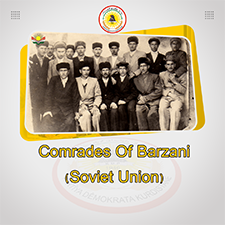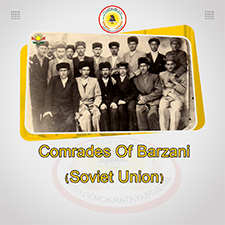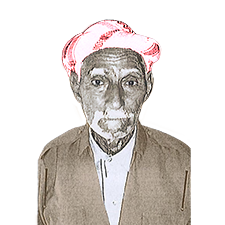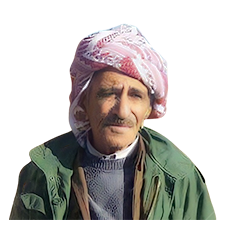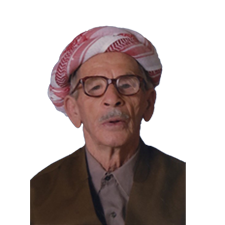Biography
He was born in 1920 in Barzani village, Barzan sub-district, Mergasur district, Erbil province. He was married before going to the Soviet Union. His family name was Maryam Omar Yasin. He studied in the Soviet Union and received a degree in agriculture. He married Jamila Mohammed Mirza in the Soviet Union. In 1959, he was the director of the Erbil Agricultural Office. He was fluent in Kurdish, Arabic, and Russian.
Service Record
In 1943, he joined the ranks of the Second Barzan Revolution and participated in the fighting. On August 19, 1945, all his mobile and non-mobile property were confiscated by order of the Iraqi Military Customary Court. On October 11, 1945, after the failure of the Second Barzan Revolution, he moved to East Kurdistan. On March 31, 1946, he joined the Barzan Force of the Kurdistan Democratic Republic Army in Mahabad and participated in the battles of the Saqiz Front in the Kurdistan Democratic Republic. He was one of the Peshmergas who returned to Sherwan and Mazuri on 19/4/1947 through Khawkurk and Dashti Barazgar in North Kurdistan.
After their return, General Mustafa Barzani held a meeting with his comrades in the village of Argosh on 15 May 1947. He gave his comrades a free choice whether they want to stay or go to the Soviet Union. All his comrades decided to continue and leave for the Soviet Union. On May 23, 1947, Saleem accompanied General Mustafa Barzani to the Soviet Union and participated in the Battle of Qtur People and the Battle of Mako Bridge. On June 18, 1947, after plenty of difficulty, he crossed the Aras River on the border between Iran and the Soviet Union.
After arriving in the Soviet Union, on June 19, 1947, he and all his comrades were detained in Nakhchivan, Azerbaijan, for forty days in an open community surrounded by barbed wire and guarded by soldiers. In terms of food, clothing, and transportation, they had been treated as prisoners of war. They were later divided into the regions of Aghdam, Lachin, Ayulakh, and Kalbajar in the Republic of Azerbaijan on the decision of the Soviet government. On December 10, 1947, they were transferred to a military base on the Caspian Sea in Baku, the capital of the Republic of Azerbaijan. On the 23rd of the same month, they were given military uniforms and received eight hours of daily military training under the supervision of officers of the Republic of Azerbaijan. At the same time, they were taught Kurdish for four hours a day by some of their educated comrades.
After Jafar Bakirov's mistreatment of his comrades, Barzani decided to move his military camp from Azerbaijan on August 29, 1948, to the community of Chirchuk near Tashkent, the capital of Uzbekistan, where they continued their military training.
In March 1949, he and his comrades were distributed by train to the villages of the Soviet Union and worked on the farms of the “Kolkhozes” (land that people rented from the government and then gave a share of the product to the government).
After much effort and sending several letters by General Mustafa Barzani to Stalin, Stalin finally received a letter in which Barzani talked about the suffering of his comrades. He immediately decided to form a committee to investigate the situation of Barzani's comrades. The committee finally decided to gather them all in Vrevsky, so in November 1951, General Barzani and his comrades went to Vrevsky, Soviet Union.
After the July 14, 1958 revolution in Iraq and the return of General Mustafa Barzani, on February 25, 1959, according to both Articles 3 and 7, paragraph (a) of Article 10 and according to Article (11), and based on the amended law No. 19, General Mustafa Barzani and his comrades were granted a general amnesty.
In 1958, the Iraqi Republic was established under the leadership of Abdul Karim Qasim. On April 16, 1959, President Barzani returned to Kurdistan with his comrades on the Groza ship through the port of Basra in southern Iraq.
In 1961, he participated in the September Revolution and was in charge of the sick and wounded. In 1963, he participated in the battles of Safin, Pirs, and Sangasar. From June 12, 1963, to December 20, 1963, Jamila Mohammadi, his wife, and six children were arrested in Erbil by the Iraqi government on charges that Zuber accompanied Mustafa Barzani and the Peshmerga. They were imprisoned and then settled in the Saydawa neighborhood. They were under the surveillance of the Iraqi government.
Saleem Zuber was the representative of Mala Mustafa Barzani in Erbil in 1970 after the March 11 agreement. He was martyred in a suicide attack in Haji Omeran on September 29, 1971, and was buried in Barzan village.
Sources:
-
ڕێكارێ مزویری، ژنێن رۆس و ڕاگواستن و ئهنفال و كۆمهلكوژی، (ههولێر - چاپخانهی مناره - ٢٠١٠ز).
-
شهعبان عهلی شهعبان، ههندێك زانیاری سیاسی و مێژوویی، چاپی سێیهم، (ههولێر - چاپخانهی ڕۆژههڵات - ٢٠١٣ز).
-
شهوكهت شێخ یهزدین، یۆبیلی زێڕینی پێشمهرگه، (پیرمام - چاپخانه خهبات - ١٩٩٦ز).
-
صالح یوسف صوفي، كرۆنۆلۆژیا كوردستانێ و جیهانێ، چاپا ئێكێ، بهرگێ سێ، (دهۆك - چاپخانا پارێزگهها دهۆكێ - ٢٠١٣ز).
-
صالح یوسف صوفي، كرۆنۆلۆژیا كوردستانێ و جیهانێ، چاپا ئێكێ، بهرگێ دووێ، (دهۆك - چاپخانا پارێزگهها دهۆكێ - ٢٠١٣ز).
-
عمر فاروقی، سردار دانا زندگی و مبارزات مرحوم ملا مصطفی بارزانی، چاپ دوم، (ههولێر - چاپخانهی وزارت آموزش و پرورش - ٢٠٠٢ز).
-
عهبدولڕهحمان مهلا حهبیب ئهبوبهكر، عهشیرهتی بارزان له نێوان ١٩٣١ - ١٩٩١، چاپی یهكهم، (ههولێر - چاپخانهی وهزارهتی رۆشنبیری - ٢٠٠١ز).
-
كاروان محهمهد مهجید، بارزانییهكان له مههابادهوه بۆ سۆڤێت، چاپی یهكهم، (سلێمانی - چاپخانهی پهیوهند - ٢٠١١ز).
-
له یادداشتی فهرماندهی شههید حهسۆ میرخان ژاژۆكی، ٦٢ رۆژ لهگهڵ بارزانی دا چوونی بارزانییهكان بۆ یهكێتی سۆڤێت، چاپی یهكهم (ههولێر - چاپخانهی رۆشنبیری - ١٩٩٧ز).
-
لیث عبدالمحسن جواد الزبیدي، ثورة ١٤ تموز ١٩٥٨ في العراق، (بغداد - دارالرشید للنشر - ١٩٧٩م).
-
مسعود بارزانی، بارزانی و بزوتنهوهی رزگاریخوازی كورد ١٩٣١ - ١٩٥٨، (دهۆك - چاپخانهی خهبات - ١٩٩٨ز).
-
نهجهف قولی پسیان، له مهابادی خوێناوییهوه ههتا لێوارهكانی ئاراس، و. شهوكهت شێخ یهزدین، چاپی یهكهم، (پیرمام - یۆبیلی زێڕینی پارتی دیموكراتی كوردستان - ١٩٩٦ز).
-
ئـ.د.ئـ، فایلی ژماره AI-١٠، لیستی ههڤاڵانی مستهفا بارزانی بۆ یهكێتی سۆڤێت، بهڵگهنامه لهلایهن سهگڤان هاڵۆ پێشكهش كراوه، ٢٠١٦ز.
-
ئـ.د.ئـ، فایلی ژماره HB-١٦٠، پارتی دیموكراتی كوردستان، بارهگای بارزانی، لێژنهی باڵای ناوچهی بارزان، فۆرمی سهلیم زوبێر مهلا شوكور، پیرمام، ١ تشرینی دووهمی ٢٠١٨ز.
-
ئـ.د.ئـ، فایلی ژماره ZB-١١١، دهقی چاوپێكهوتن لهگهڵ سهفین سهلیم زوبهیر لهلایهن نهزیره مێرگهسۆری، پیرمام، ٢٣ حوزهیرانی ٢٠١٩ز.
-
ئیسماعیل گوندهژووری، ئهو ئافرهته ڕووسانهی كه هاوسهریان پێشمهرگه بوون و كهوتنهبهر ڕهشگیری، ئۆرگانی پارتی دیموكراتی كوردستان، رۆژنامهی خهبات، ژماره ٣٤٦١، ههولێر، ٣ ئایاری ٢٠١٠ز.




